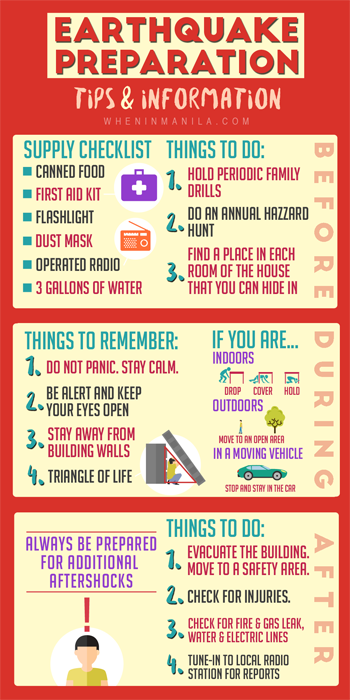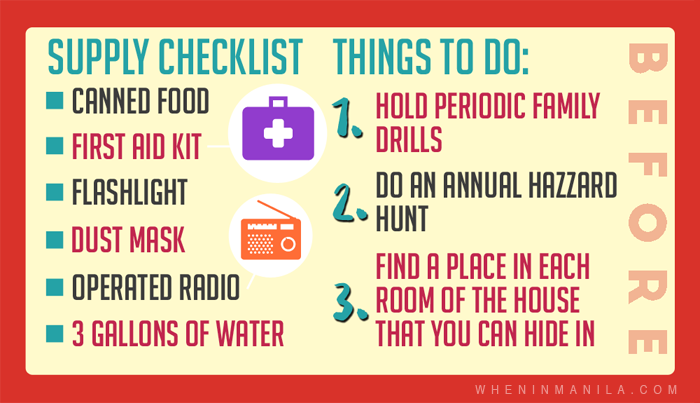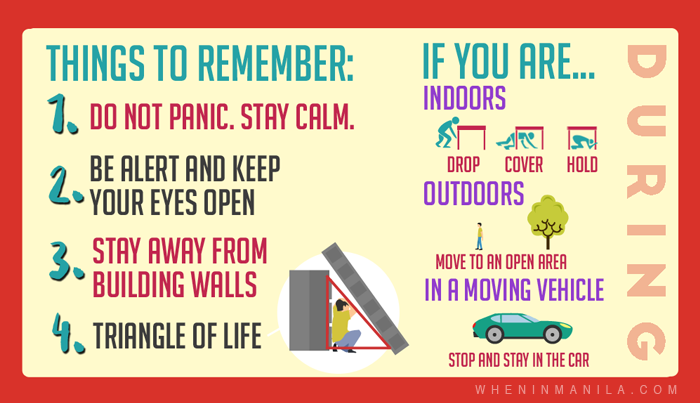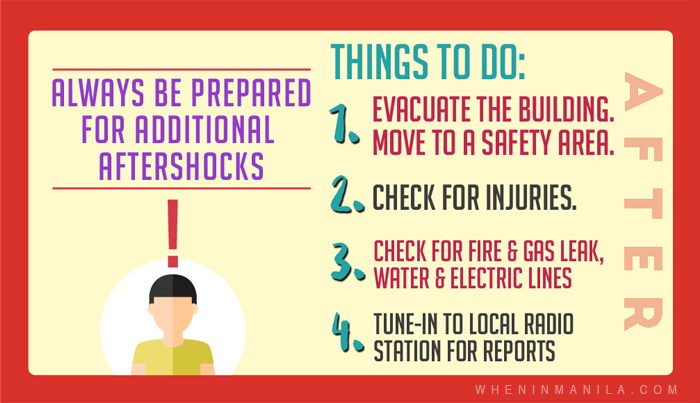Last July 30, 2015 the Metro Manila Development Authority conducted a metro-wide earthquake drill. This is in preparation for an earthquake that could hit Metro Manila by a magnitude of 7.2, kill 33,500 people and destroy 40% of infrastructures. This is what the experts referred to as the “Big One”.
So here are a few more tips and information on what to do and how to prepare before, during and after an earthquake.
Here’s a better Hi-Res version.
Before:
Preparation is always the key before an earthquake. As we all know, the Philippines is part of the Pacific Ocean’s Ring of Fire where seismic activities happen regularly. We cannot really predict the exact time and date an earthquake will occur, so it’s good to stay prepared at all times.
- Make sure to have an emergency kit ready.
- Conduct periodic family drills. Know where to meet and hide during an earthquake, learn your work or school’s earthquake plan.
- Do an annual hazard hunt where you fix things that might be a problem during an earthquake. For example, securing loose items in shelves and cabinets as well as not leaving heavy things on top of furniture.
- It is also good to have proper first-aid training as it will come handy not only during an earthquake but other times as well.
- Make sure you know where the nearest fault runs are in your area. Click here for the complete list.
During:
No matter what happens, always keep in mind to stay calm and never panic. Panicking will only make things worst.
- If you’re indoors, stay indoors.
- Stay away from windows and outside doors.
- Be ready to drop on your hands and knees.
- Cover your head and neck and hide under a sturdy table.
- Hold on to your shelter until the shaking stops.
- “The Triangle of Life” – If there are no shelters near by, drop down near a low-lying furniture that won’t fall on you, and cover your head and neck with your arms and hands (however, there are reports saying that this is a hoax, but Red Cross officially said that this may be a better option than “Drop, Cover, Hold On” in some countries. I personally think it is better to explore all options for when your first plan fails, you still have a back up.)
- If you’re outside, stay outside but keep away from power lines, buildings, or anything that might fall.
- Don’t use matches, candles, or any flame.
- Also, never use the elevators. Big chance they will get stuck.
After:
- Once the shaking stops, evacuate the house or the building and move to a safety area.
- Check for injuries but never move someone who is badly injured unless they are in danger for further injury. As much as possible, wait for professional help to come.
- Check damages around the vicinity and for potential fire and gas leak as well as the water and electricity line.
- Don’t go barefoot.
- Don’t use the telephone unless it’s a major emergency but instead tune-in to your local radio station and for reports and updates.
- Always cooperate with the police, firemen, and other officials who are in charge.
- Lastly, always be prepared for an aftershock. Some of these maybe smaller than the main shock, but some may be strong enough to cause additional damage. Stay away from beaches. Tsunamis and seiches sometimes hit after the ground has stopped shaking.
There are still a lot more to learn about earthquake preparation so researching more on this topic will also help you a lot. As they say, there is nothing wrong with being prepared.
What do you do in order to stay prepared for an earthquake?
Do you have other tips and information you would like to share everyone?
Comment below!
Sources:
https://www.bt.cdc.gov/disasters/earthquakes/








